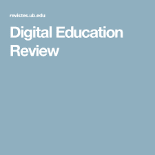
Digital Education Review
Scope & Guideline
Advancing Knowledge in Educational Technology
Introduction
Aims and Scopes
- Integration of Artificial Intelligence in Education:
The journal consistently publishes research on the application of AI in educational settings, exploring its potential for enhancing learning outcomes, assessment practices, and teacher development. - Technology-Enhanced Learning Environments:
Research often focuses on the design and implementation of technology-enhanced learning environments, highlighting co-creation processes and the role of digital tools in facilitating collaborative learning. - Digital Literacy and Competence Development:
A core area of focus is on digital literacy, examining how educators and learners develop competencies to navigate and utilize technology effectively in educational contexts. - Impact of Technology on Pedagogy:
The journal addresses how emerging technologies influence teaching practices and pedagogical approaches, providing insights into innovative teaching strategies and methodologies. - Equity and Access in Digital Education:
Research often explores issues related to digital equity, addressing the digital divide and how different demographics experience technology in educational settings.
Trending and Emerging
- Generative Artificial Intelligence in Education:
Recent publications highlight the role and implications of generative AI tools in educational settings, focusing on their potential to transform feedback mechanisms, assessment, and teaching methodologies. - Collaborative Learning and Co-Creation:
There is a growing trend toward research that investigates collaborative learning environments, particularly how technology facilitates co-creation and peer collaboration among students and educators. - Impact of Digital Transformation on Teacher Development:
Emerging themes focus on how digital transformation influences teacher professional development, emphasizing the need for educators to adapt to new technologies and integrate them into their teaching practices. - Ethical and Philosophical Considerations of Technology in Education:
Recent articles have begun to explore the ethical implications of using technology in education, including concerns about privacy, data security, and the broader societal impacts of educational technologies. - Gamification and Engagement Strategies:
There is an increasing interest in the application of gamification strategies in educational contexts, examining how these methods can enhance student engagement and learning outcomes.
Declining or Waning
- Traditional Educational Methods:
There has been a noticeable decrease in research focusing solely on traditional educational methods without the integration of technology, indicating a shift towards more innovative, tech-driven approaches. - General Technology Usage in Education:
Research that discusses generic technology usage without specific applications or pedagogical frameworks has diminished, suggesting a trend towards more targeted studies that analyze specific technologies or methodologies. - Focus on Non-Digital Learning Strategies:
With the rise of digital tools, there has been a decline in research centered on non-digital learning strategies, as the emphasis has shifted towards understanding the implications of digital integration.
Similar Journals

TECHNOLOGY IN SOCIETY
Driving Insights at the Crossroads of Society and TechnologyTechnology in Society, published by Elsevier Science Ltd, is a premier journal dedicated to exploring the interplay between technological advancements and their societal implications. With an ISSN of 0160-791X and an E-ISSN of 1879-3274, this journal has established itself as a pivotal resource since its inception in 1979. The journal's impact factor and its prestigious Q1 ranking in categories including Business and International Management, Education, Human Factors and Ergonomics, and Sociology and Political Science underscore its significance in fostering high-quality scholarship. The journal aims to publish articles that critically examine the multifaceted effects of technology on society, making it essential reading for academics, practitioners, and policy-makers alike. As it continues to evolve through 2024, Technology in Society remains committed to disseminating important research that drives understanding and dialogue in today’s technology-driven landscape.
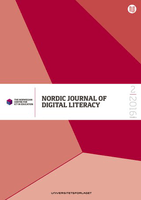
Nordic Journal of Digital Literacy
Exploring New Frontiers in E-learning and Digital CompetenceThe Nordic Journal of Digital Literacy, published by UNIVERSITETSFORLAGET AS, is a pioneering open-access journal dedicated to advancing research in the fields of Digital Literacy, Computer Science Applications, and E-learning. With an ISSN of 0809-6724 and an E-ISSN of 1891-943X, this journal highlights innovative studies that intersect education and digital technology, contributing significantly to the academic discourse in these rapidly evolving domains. The journal, based in Norway, has established itself within the academic community by achieving a commendable Q2 ranking in its respective categories for 2023. It currently ranks 518th out of 1543 in Social Sciences - Education and 461st out of 817 in Computer Science - Computer Science Applications according to Scopus metrics. By focusing on accessible research since its transition to open access in 2009, the Nordic Journal of Digital Literacy not only aims to disseminate knowledge but also empowers educators, researchers, and practitioners to integrate digital literacy into their practices, thus addressing the pressing educational demands of the digital age.

Innoeduca-International Journal of Technology and Educational Innovation
Empowering Education Through Innovative TechnologyInnoeduca - International Journal of Technology and Educational Innovation, published by the esteemed Universidad de Málaga, stands at the forefront of the rapidly evolving intersection of technology and education. With an E-ISSN of 2444-2925, this open-access journal has proudly disseminated cutting-edge research and innovative practices in educational technology since 2015. It aims to empower researchers, educators, and policymakers by providing a platform for sharing knowledge, insights, and advancements that enhance the learning experience through technology. The journal covers a wide array of topics, including digital learning environments, instructional design, and the impact of emerging technologies on education. By offering free access to its articles, Innoeduca fosters a global dialogue among professionals and students alike, making a significant contribution to the field of education innovation and technology.
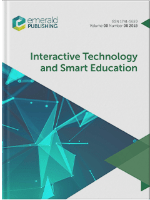
Interactive Technology and Smart Education
Innovating education: where technology meets pedagogy.Interactive Technology and Smart Education is a leading academic journal published by EMERALD GROUP PUBLISHING LTD, dedicated to exploring the dynamic intersection of technology and education. With a robust impact factor signifying its significant contributions to the field, this journal consistently ranks in the Q1 quartile in categories such as Computer Science (Miscellaneous), Education, and E-learning, reflecting its prestige and wide-ranging influence. A staple for researchers, educators, and industry professionals, the journal addresses innovative practices and developments in interactive technologies that enhance teaching and learning experiences. Operating from its base in the United Kingdom, the journal spans nearly two decades of impactful publishing, featuring high-quality research that plays a crucial role in shaping the future of education through technology. Scholars seeking to stay at the forefront of this evolving field are encouraged to contribute and engage with the journal's pioneering work.

Etic net-Revista Cientifica Electronica de Educacion y Comunicacion en la Sociedad del Conocimiento
Unlocking Insights in Education and CommunicationEtic net-Revista Cientifica Electronica de Educacion y Comunicacion en la Sociedad del Conocimiento, published by UNIV GRANADA, is a pioneering open-access journal dedicated to the exploration and dissemination of research in the fields of education and communication within the context of knowledge society. Since its inception in 2002, this journal has provided a platform for scholars, researchers, and practitioners to share innovative ideas and empirical studies, fostering critical dialogue and collaboration in the rapidly evolving landscape of digital education and communication. With its ISSN 1695-324X, Etic net aims to bridge theoretical frameworks and practical applications, contributing significantly to the scholarly discourse and practices that shape contemporary educational experiences globally. Through its commitment to open access, the journal ensures that high-quality research is freely available to all, promoting inclusivity and accessibility in academic publishing. We invite you to explore the latest findings and contribute to shaping the future of education and communication by engaging with this essential resource.

Ensayos-Revista de la Facultad de Educacion de Albacete
Fostering innovation in teaching and learning practices.Ensayos-Revista de la Facultad de Educacion de Albacete is a distinguished open-access journal dedicated to the field of education, published by UNIV CASTILLA-LA MANCHA, ESCUELA MAGISTERIO ALBACETE. Since its inception in 2011, the journal has provided a platform for high-quality research and innovative pedagogical practices, fostering academic discourse and collaboration among educators, researchers, and practitioners in the education sector. With an ISSN of 0214-4824 and E-ISSN 2171-9098, it is committed to disseminating knowledge that enhances educational outcomes and promotes effective teaching methodologies. The journal is located in Albacete, Spain, and emphasizes the importance of educational research in shaping contemporary educational frameworks. By ensuring open access to its content, Ensayos makes its research widely available, allowing for greater impact and engagement within the academic community. This commitment to accessibility positions the journal as a valuable resource for anyone invested in the advancement of education.
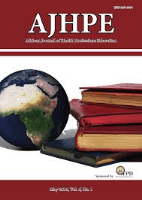
African Journal of Health Professions Education
Transforming Healthcare Through EducationAfrican Journal of Health Professions Education (ISSN: 2078-5127, E-ISSN: 2078-5127), published by HEALTH & MEDICAL PUBLISHING GROUP, is a premier open access journal dedicated to advancing the field of health professions education across Africa and beyond. Launched in 2009, this journal provides a platform for sharing innovative research, pedagogical practices, and policy developments that enhance educational methodologies in healthcare-related disciplines. With its commitment to accessibility, the journal facilitates the dissemination of knowledge to researchers, practitioners, and students alike, thereby contributing significantly to the improvement of health outcomes through effective education. The journal's scope encompasses various areas, including curriculum development, assessment strategies, and the integration of technology in health professions education, making it an invaluable resource for anyone engaged in health education research and practice.
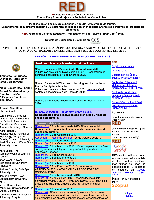
RED-Revista de Educacion a Distancia
Exploring the Future of Learning in a Digital WorldRED-Revista de Educacion a Distancia is a premier open-access journal published by UNIV MURCIA in Spain, dedicated to advancing research in the fields of education and computer science applications. Since its inception in 2001, the journal has served as an essential platform for disseminating innovative research and practical applications of distance education methodologies. With an impressive impact factor and ranked in Q2 across both Computer Science Applications and Education categories as of 2023, RED is recognized for its significant contribution to the scholarly community, particularly within the Social Sciences and Engineering domains. Researchers and professionals are invited to explore cutting-edge studies that underpin pedagogical effectiveness and technological integration in educational settings. Based at the Edificio Pleiades Campus de Espinardo in Murcia, RED continues to foster an engaging dialogue among academics, providing insights that propel the field forward.

CALICO Journal
Advancing the Future of Language Education through Technology.CALICO Journal, published by EQUINOX PUBLISHING LTD, stands at the forefront of research in the intersection of technology and language education. With a prestigious history that spans from 1983 to 2024, this journal has been pivotal in advancing the field, earning high rankings in multiple categories, including Q1 in Education and Linguistics and Language, as well as Q2 in Computer Science Applications. Researchers and educators alike benefit from its wealth of articles that delve into innovative pedagogical strategies, the application of technology in language learning, and the exploration of linguistic theories. Although the journal is not currently open access, its impactful contributions are widely recognized, as evidenced by its strong Scopus rankings, placing it in the 88th percentile for Language and Linguistics. CALICO Journal remains an essential resource for those looking to enhance their practice and expand their knowledge in the dynamic fields of language learning and technology integration.
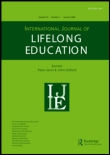
International Journal of Lifelong Education
Advancing Knowledge for Every Stage of LifeThe International Journal of Lifelong Education, published by Routledge Journals, Taylor & Francis Ltd, is a leading peer-reviewed journal dedicated to the dynamic field of lifelong learning. With an impressive convergence of research spanning from 1982 to 2024, the journal focuses on vital themes in education, e-learning, and life-course studies, and boasts a commendable Q2 ranking within its categories for 2023. It serves as an essential platform for researchers, educators, and professionals to explore and share innovative ideas and practices that address the complexities of lifelong learning in today's rapidly changing educational landscape. Although it does not currently offer Open Access, the journal provides robust access options through various academic databases, ensuring a wide audience reach. With its significant impact within the field, exemplified by its Scopus ranks—528th in Education and 30th in Life-span Studies—this journal is indispensable for those seeking to contribute to and stay informed about the latest advancements in lifelong education.